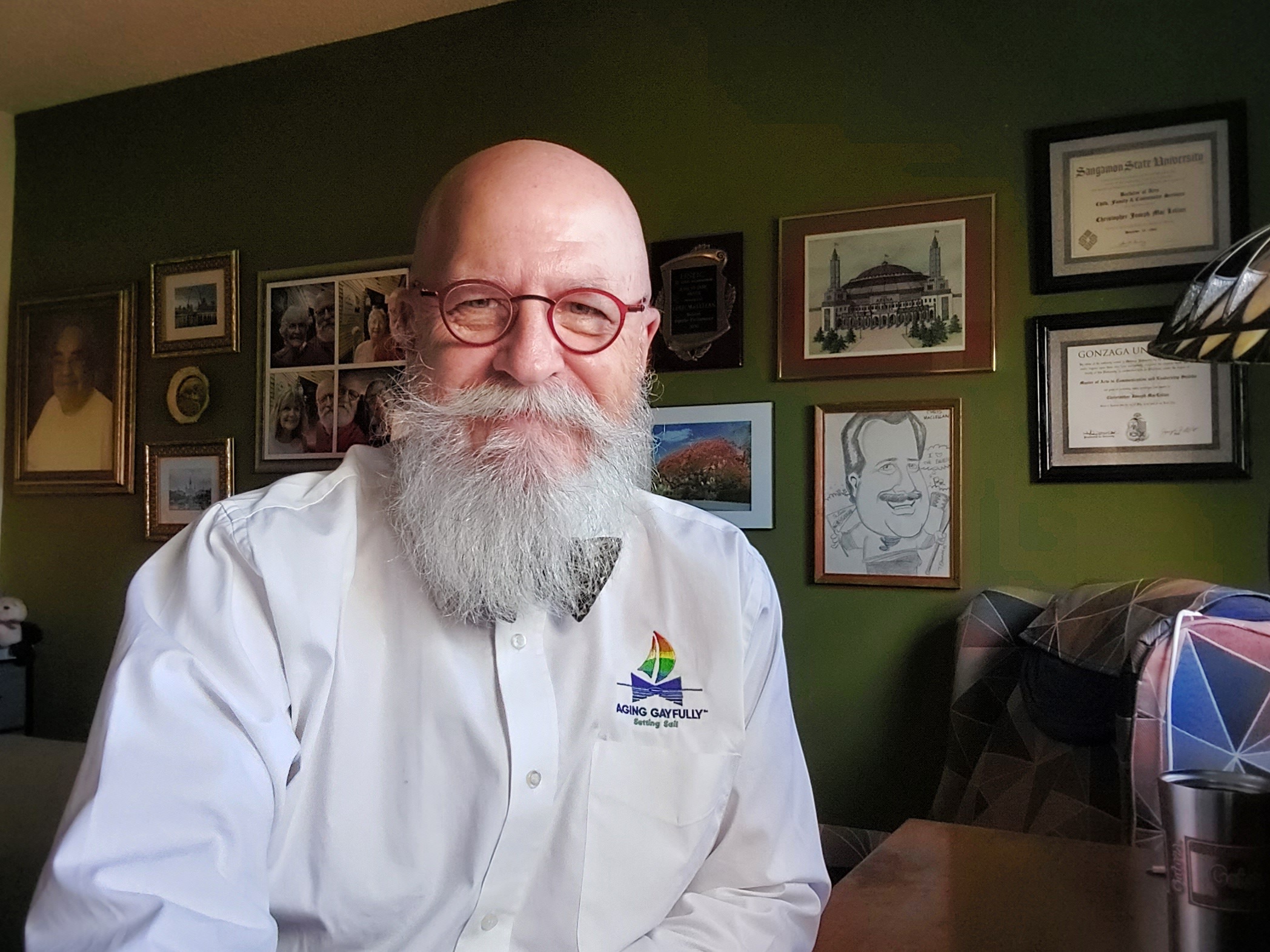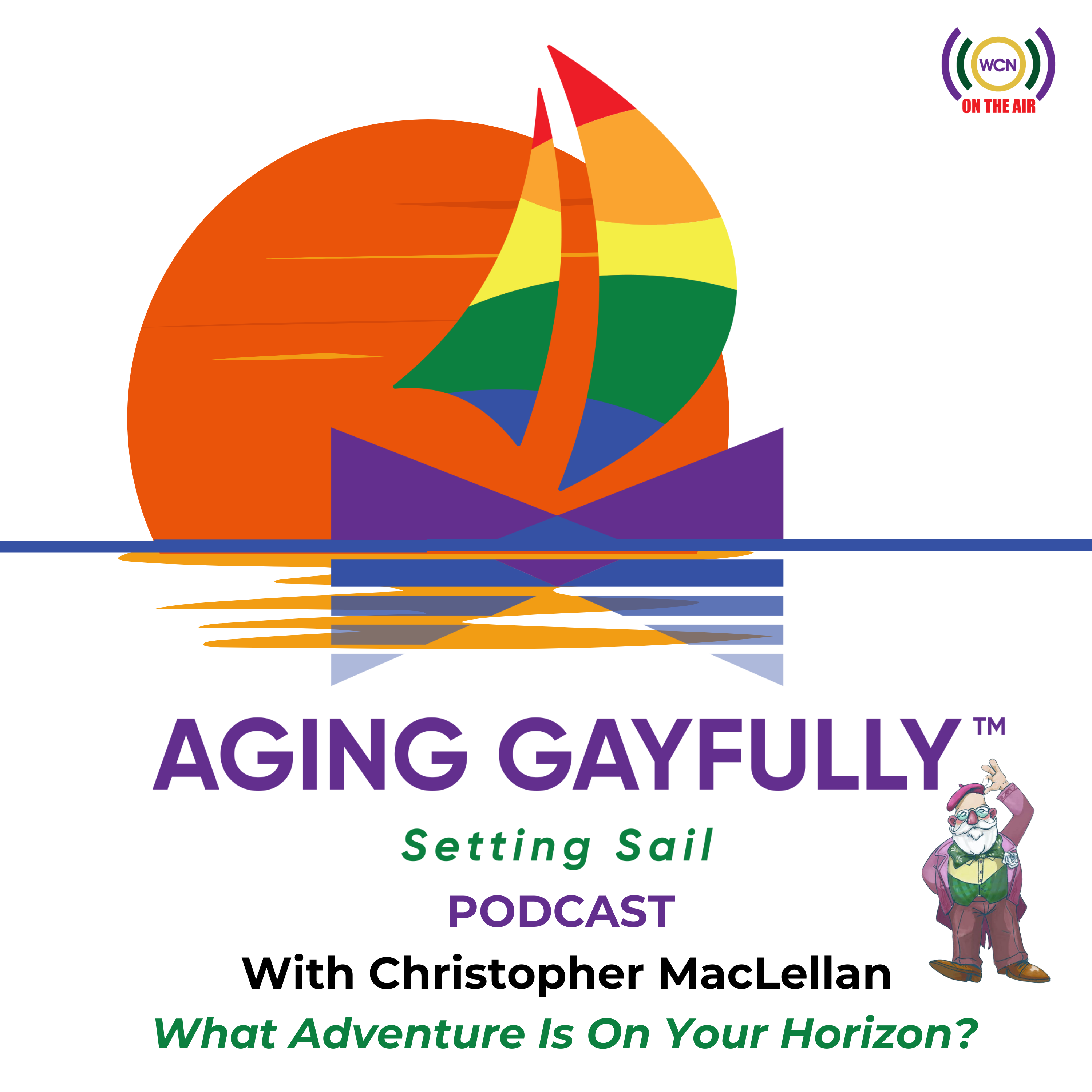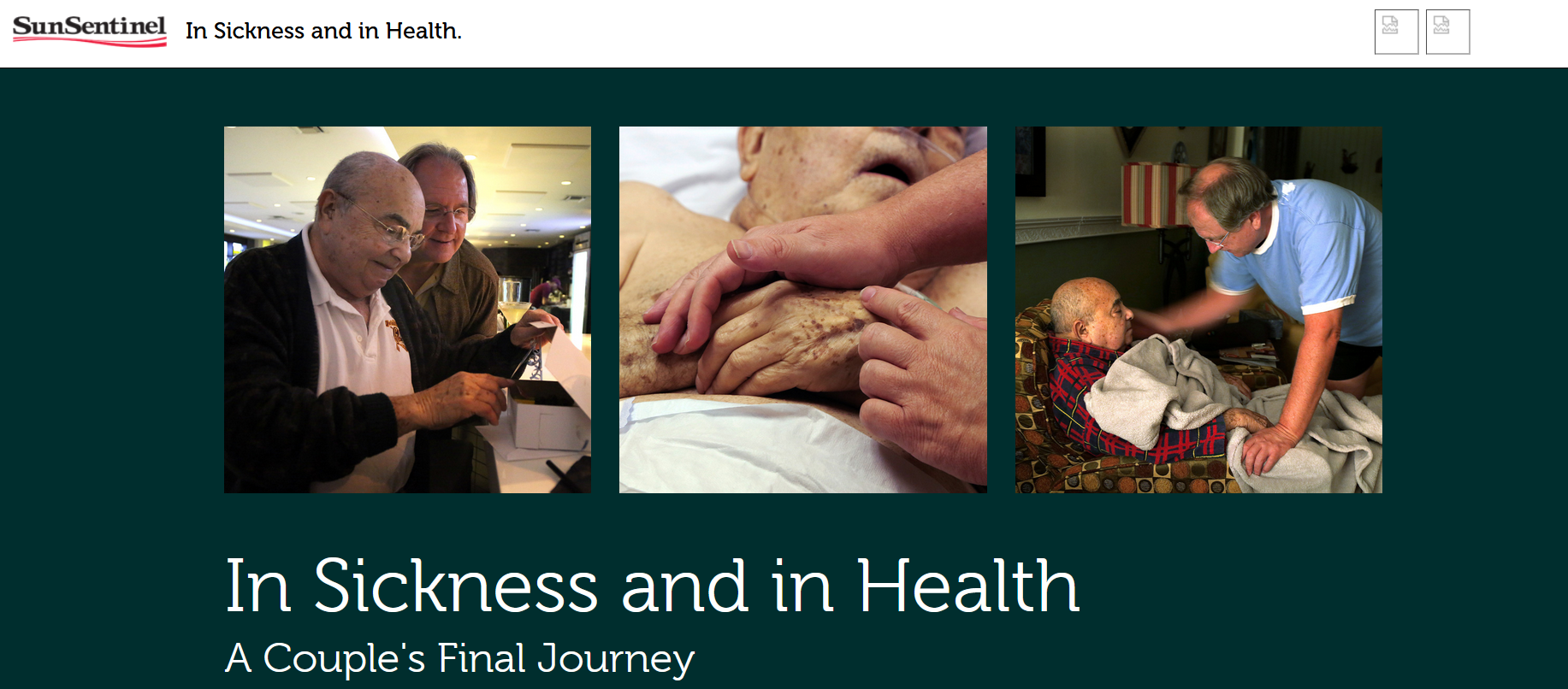The green folder
With his partner gone, MacLellan felt alone in more ways than one.
His thoughts turned to their shared green folder, where the couple had kept legal documents like living wills, health care surrogate forms and powers of attorney. MacLellan and Schiffer had worried because gay and lesbian couples aren’t automatically granted the right to make medical decisions for each other — so the green folder accompanied them almost everywhere.
Now, MacLellan wondered: Whose name would replace Schiffer’s in the green folder? Who would be his surrogate?
MacLellan has no children. Although he has good relationships with his five siblings, all live hundreds of miles away.
And if he named a family member, what would happen in the event he fell in love again and another partner came into his life?
Still working as senior services coordinator at SunServe, a gay and lesbian social service agency in Wilton Manors, MacLellan in April turned to friend Katharine Campbell.
Campbell, a Wilton Manors psychotherapist who had been SunServe’s mental health program director, said she wasn’t surprised when MacLellan approached her with the life-and-death responsibility.
“I’ve been asked to do this so many times in South Florida,” said Campbell, 39, formerly a medical social worker.
She said relatives sometimes reject gay and lesbian seniors, or grow distant once they’re widowed, assuming grief isn’t part of losing a partner.
“We have an aging LGBT community, and they are starting to realize, in the state of Florida, they need these forms,” Campbell said.
MacLellan was relieved when she said yes.
The house
It took MacLellan a bit longer to make a decision about the house he had shared with Schiffer.
Right before meeting MacLellan in 2003, Schiffer had taken out a reverse mortgage on the house he had purchased 15 years ago with his late partner, in the Deerfield Beach Natura retirement community.
A reverse mortgage allows homeowners age 62 or older to draw money from the equity without paying it back. Like many seniors, Schiffer took this route when his medical bills began mounting.
The catch: When the senior borrower dies, the property’s inheritors may have to buy back the house from the lender if they want to keep it.
MacLellan wasn’t named on the deed. Under federal regulations passed in August, widowed spouses and partners who aren’t listed as borrowers on the loan can stay in the home until they die as long as they pay for taxes, insurance and upkeep. The rule applies to gay and heterosexual couples, to partnerships as well as legal marriages, said officials with the U.S. Department of Housing and Urban Development.
This didn’t apply to MacLellan, however. The new rule affects only mortgages taken out on and after Aug. 4, 2014. He wouldn’t have qualified anyway for multiple reasons, including that he wasn’t with Schiffer at the time the loan was taken out.
MacLellan didn’t know if he wanted to repurchase, short sell or foreclose on the little white house, still filled with hundreds of Schiffer’s Wedgwood pottery pieces and knickknacks. The lender told him he had a year to decide, he said.
MacLellan drifted on the tide of his grief. He cut his hair, which he had left long because Schiffer liked it. He went back to work. A few men, knowing MacLellan was single again, asked him out for coffee or to see a movie, and he agreed half-heartedly.
On May 22, MacLellan found a bright yellow “No trespassing” sign posted on his front door.
The posting said the property was being claimed by the bank, and MacLellan panicked. He envisioned police arriving within hours and watching him as he scrambled to remove cherished mementos.
After making calls, MacLellan learned he still had until March 2015 to make a decision. He took down the yellow “No trespassing” notice and stored it in the green folder.
The scare jolted him out of the haze of his mourning, though. He wasn’t sure if he wanted to be tied down to the house. “Too many memories. And it needs a lot of work,” he said.
What sealed his decision was having to drive himself to the emergency room in mid-July, convinced he was having a heart attack. The doctors said it was stress.
MacLellan opted to walk away from the house and started packing in August. He sold all of Schiffer’s collectibles, the furniture and appliances — netting almost $10,000.
Among the few items MacLellan kept: some lamps and artwork he and Schiffer had purchased together, and an old album filled with black-and-white photos of Schiffer and his previous partner, one showing them standing in front of their then-new house with their real estate agent.
He also kept three ceramic Wedgwood eggs, one of which contains some of Schiffer’s ashes.
One neighbor, shortly after MacLellan was served his foreclosure summons, came over to say goodbye and offer condolences. The rest watched at a distance.
MacLellan decided to stay with a friend until leaving town. On Labor Day weekend, he locked up for the last time and drove away.
The move
Shedding the house opened a door for MacLellan, and he eagerly walked through.
Instead of staying in South Florida, with its large gay and lesbian senior population, or returning to his hometown of St. Louis, he turned his sights to New Orléans. That’s where one of his sisters, Gerri Cortello, lives.
Cortello, 65, said she knows little about her brother’s life as a gay man, although she had met Schiffer. It was a topic they never discussed, she said.
Cortello was stunned, when reading the Sun Sentinel’s story on Schiffer’s final months, by the challenges he and her brother had faced.
Cortello knows about caregiving. She was only 27 when her husband died of pancreatic and liver cancer, leaving her with four young children.
It hadn’t occurred to her, however, that a man dying of cancer and his longtime partner would be treated any differently than she and her husband had been 38 years ago.
“I hope that, somehow, we can get some laws changed. It’s not fair,” said Cortello. In Louisiana, like in Florida, gay marriage remains illegal.
Processing the death of someone you love has no timetable, Cortello said, whether your beloved is the same gender as you or not, whether you are young or old.
“You have to let people feel what they feel. There is no time frame. You feel so … cheated, I guess,” said Cortello.
What’s next?
MacLellan quit his job at SunServe, where he had worked for almost three years, as he finalized his moving plans in August.
His dream is to write a book about his end-of-life journey with Schiffer, and he’s trying to restart an Internet radio show about caregiving, called “Healing Ties from Chris MacLellan the Bow Tie Guy.”
While a social worker by training, MacLellan is eager to forge a new career in media and is working on a master’s degree in communications and leadership online through Washington-based Gonzaga University. He knows it may be challenging to make a living this way, he said, even with the help of staying with family.
Money is an issue. When Schiffer died, his $1,300 in monthly federal benefits were gone, too — more than half of the couple’s household income. Florida’s lesbian and gay couples, at this point, are not entitled to survivor Social Security benefits, even if they were legally married elsewhere, said Stephanie Schneider, a Plantation elder-law attorney who worked with MacLellan and Schiffer.
After paying off medical and funeral expenses, MacLellan said just $400 remained in Schiffer’s bank account.
In mid-August, about a dozen of MacLellan’s co-workers gathered for a farewell party at SunServe. One commented that MacLellan’s sudden, dramatic changes — selling everything, leaving town without a job or much of a nest egg, writing a book — sounded “kind of scary, kind of exciting.”
“Yes, it caught me by surprise,” said his former boss, SunServe Executive Director Mark Ketcham. “But I support [MacLellan] fully. There are some people who can’t get out of bed for two years when someone dies. But there are some who mourn and move on.”
Ketcham said SunServe is exploring new ways to serve South Florida’s aging gay and lesbian community, in part sparked by MacLellan’s experiences.
More than a year ago, the agency started a cultural competency program aimed at training nursing homes and health care institutions to be more welcoming to gay and lesbian patients. SunServe has since certified two assisted-living centers and a home health agency, said Jim Lopresti, SunServe’s director of clinical services who is handling the program.
In the Sun Sentinel story, MacLellan described an incident last year when he had rushed Schiffer to the Broward Health North emergency room but was ignored by staff as they questioned his partner.
Just days after the story, the hospital’s CEO asked MacLellan to meet with her managers and began arranging competency training for the emergency room. Hands-on sessions with the Broward Health North staff will begin later this year, Lopresti said.
SunServe also may begin a referral service to connect aging gay and lesbian seniors with gay-friendly providers and help manage their care, Ketcham said.
While MacLellan isn’t involved in these efforts, he already has plans to continue his work promoting awareness of issues facing gay and lesbian seniors and their caregivers. He’s booked to speak at an AARP-Broward Health system roundtable discussion on LGBT caregiving in Fort Lauderdale in November, and another conference on LGBT aging in Nebraska later this fall.
Would he ever return to South Florida permanently? “Who knows?” MacLellan said. “At this point, I can go in whatever direction life takes me.”
Letting go
MacLellan traveled light into his new life. He left the house completely empty, the hurricane shutters covering the windows. He shipped a few boxes of belongings to New Orléans, packing the rest into his small car.
One last decision remained: What to do with Schiffer’s ashes. “I just can’t carry him around with me, I can’t,” MacLellan said.
His early September departure date was nearing. One night, he literally woke up with the answer.
“Richard loved going on cruises. So I just felt this was the final cruise he could go on and be happy,” he said, explaining how he came to be on a boat heading out from the Boynton Beach inlet.
Three people accompanied him: Ketcham, his former SunServe co-worker Bryan Wilson and Jamie Evans, who had been Schiffer’s favorite home health aide. Evans had been the person Schiffer trusted to see him at his worst, when he needed someone to bathe him and help him change clothes.
Now Evans helped MacLellan tuck, inside the boat’s cabin, two beautiful handmade, biodegradable paper boxes, in place of urns. One contained Schiffer’s ashes. The other held the remains of Schiffer’s former partner, which had sat on a bookcase for more than a decade.
When the boat was 3 miles offshore, the captain idled the engine, turning the bow into the wind. The plan was to place the partner’s box in the water first, then Schiffer’s.
Along the way, MacLellan suddenly began questioning whether to leave Schiffer’s box sealed.
“Set him free,” Ketcham told MacLellan, insisting Schiffer would have wanted him to open the box.
The moment came, and MacLellan began to cry. “By doing this today, I am able to regain some of the strength I have lost over the past few months,” he said to those gathered. “It’s a fitting start to a new beginning.”
He first dropped Schiffer’s partner’s container overboard. It landed on the deep blue water with a soft plop, like a pillow on a bed. Then, taking the box holding all that was left of the man he’d loved in sickness and in health, MacLellan leaned over the boat’s side and opened the lid.
The contents flew out and settled on the waves, spreading out slowly. MacLellan let go of the now-empty white box. It remained visible for a long time, drifting toward the open sea as the boat headed back to shore.
dlade@sunsentinel.com or 954-356-4295 954-356-4295
954-356-4295
More online
Find the original series and video at SunSentinel.com/finaljourney and watch as Chris MacLellan says a final goodbye at SunSentinel.com/goodbye.












































